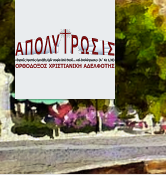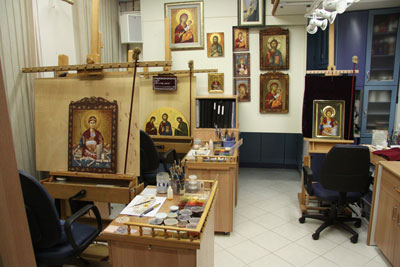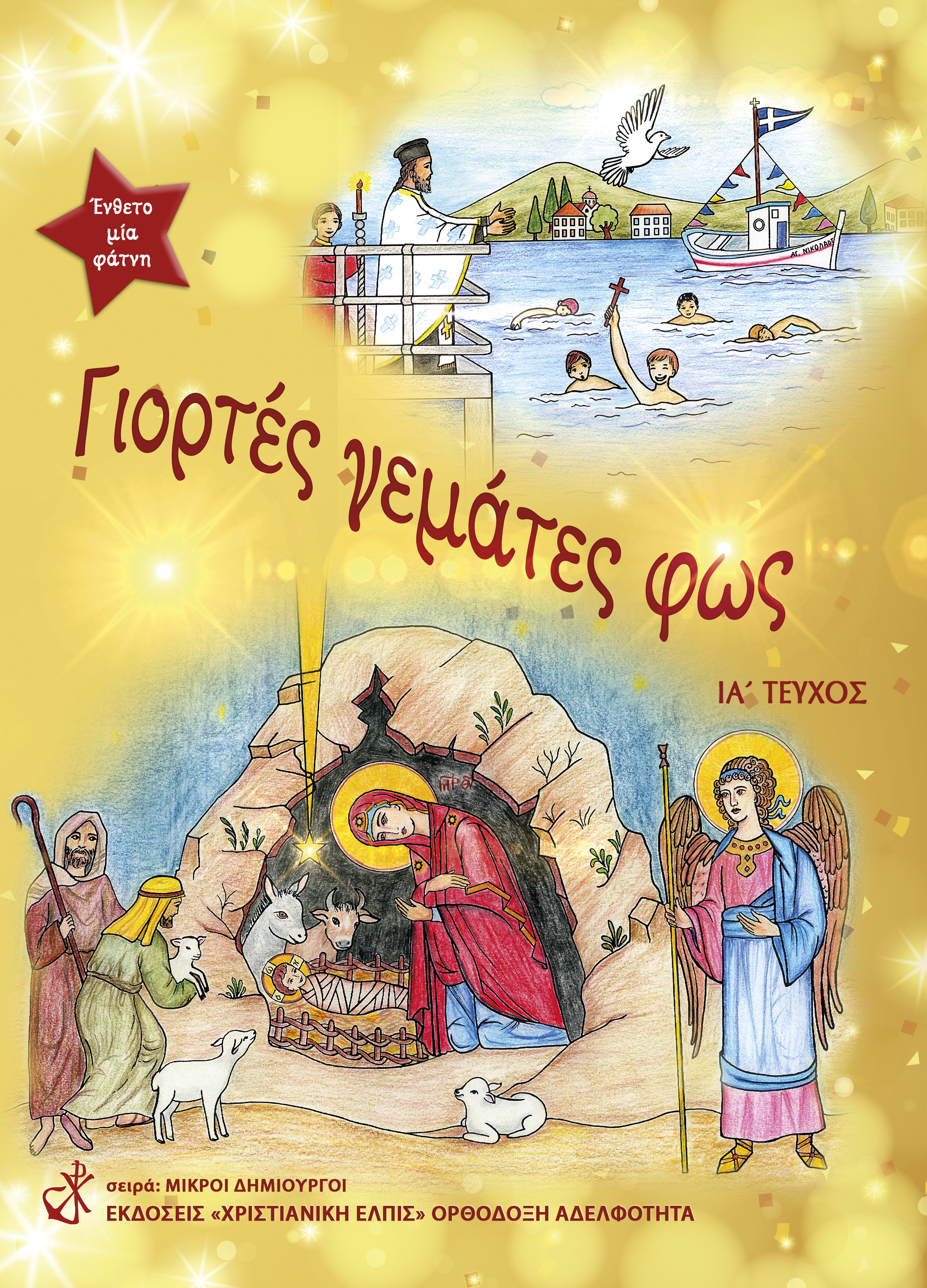 ΑΠΟΛΥΤΡΩΣΙΣ
ΧΡΙΣΤΙΑΝΙΚΗ ΟΡΘΟΔΟΞΗ ΑΔΕΛΦΟΤΗΣ
ΑΠΟΛΥΤΡΩΣΙΣ
ΧΡΙΣΤΙΑΝΙΚΗ ΟΡΘΟΔΟΞΗ ΑΔΕΛΦΟΤΗΣ
Super User
ΕΟΡΤΑΣΤΙΚΗ ΕΚΔΗΛΩΣΗ ΓΙΑ ΤΗΝ ΕΘΝΙΚΗ ΜΑΣ ΕΠΕΤΕΙΟ
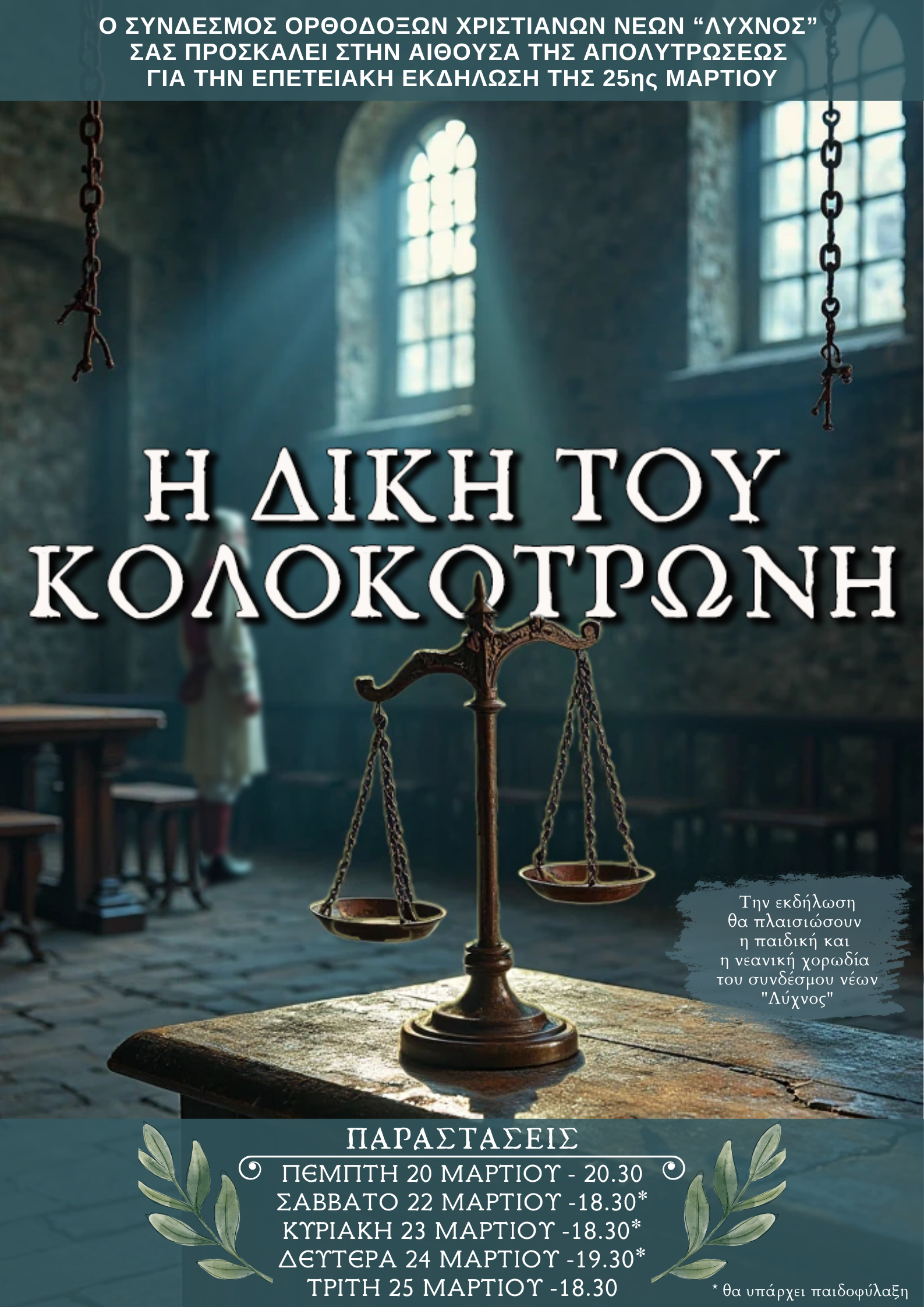
What does Orthodoxy mean?
Translation from the article:
Στεργίου Ν. Σάκκου, Τί σημαίνει Ὀρθοδοξία, περιοδ. "Ἀπολύτρωσις" 50 (1996) 56-57.
(Stergios N. Sakkos, University Professor [Read CV])
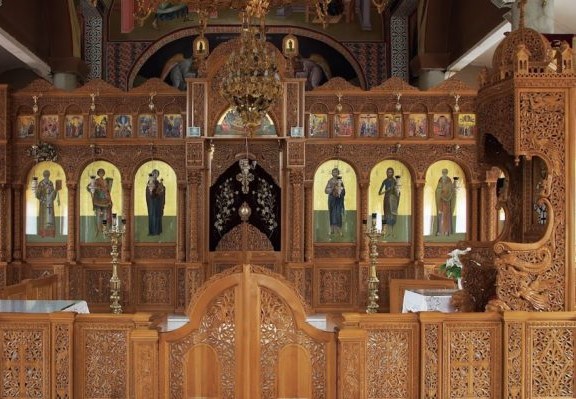 Many people talk about Orthodoxy these days. We hear them on TV channels, we read them in newspaper columns, we see them as authors of various publications and books. According to their words, Orthodoxy is a type of culture or a type of folklore, depending on the guiding preference of each relevant thinker. It is a form of civilization - always exceptional and unique - or a characteristic of the people of Romiosini (Helenism)- in any case special and worthy of attention. This makes Orthodoxy seem more like an ideology, a philosophy or a worldview, a popular religion, than the revelation of God that it really is.
Many people talk about Orthodoxy these days. We hear them on TV channels, we read them in newspaper columns, we see them as authors of various publications and books. According to their words, Orthodoxy is a type of culture or a type of folklore, depending on the guiding preference of each relevant thinker. It is a form of civilization - always exceptional and unique - or a characteristic of the people of Romiosini (Helenism)- in any case special and worthy of attention. This makes Orthodoxy seem more like an ideology, a philosophy or a worldview, a popular religion, than the revelation of God that it really is.
The Orthodox Church of Christ also speaks of Orthodoxy. And it speaks not only now, when it is fashionable to speak about Orthodoxy and to be in the light of publicity, but it has been speaking for at least twenty centuries, from the moment it was born and it speaks in the low tones of humble speech in the devout atmosphere of the meek spirit. For those of us who are genuinely interested in Orthodoxy, I think it is worth paying attention to it, because it is the only one that deserves our attention, because the Orthodox Church is the only expert on the subject.
We could say - with a very general simplification, of course, for practical reasons - that Orthodoxy is identified with the Church, the one, holy, Eastern Church. Its characteristics are the characteristics of the Church and they are none other than the characteristics of the God-man person of Jesus Christ, since the Church is the mystical Christ, which extends throughout the ages, according to the expression of Saint Augustine. This is revealed by the teachings of the Fathers, who have been the pillars of the Church, it is demonstrated by the lives of the saints who martyred for Orthodoxy, it is testified by the common conscience of the Orthodox faithful. Thus, we have immediately and surely a specific and clear view of Orthodoxy, which the history of the Church irrefutably testifies to.
First of all and above all, Orthodoxy is a way of life based on divine truth. It certainly creates culture, shapes ethos, but these are results, not its essence. Orthodoxy is the path of God, which requires that it be walked in obedience to the revealed truth and with discipline in the divine commandment. The combination of the right faith (orthodoxy) with the holy living (orthopraxis) is a characteristic of Orthodoxy “of those things which are not without.” The apostle Paul formulates this verbatim for the umpteenth time when, at the end of his life he confesses to his disciple Timothy, “I have fought the good fight, I have finished the course, I have kept the faith” (2 Tim. 4:7).
The Church delivers the doctrine and the commandment, holding in one hand the inspired Scripture and in the other the sacred Tradition. Doctrines are the revealed truths of the divine word as formulated by enlightened saints after the Church’s struggles and battles with evil and deceitful spirits. Commandments are the ethical exhortations of the divine word, as lived by the saints of every age, who were not conformed to any scheme of their time, but were transformed into vessels of the Holy Spirit. But all this could never be accepted by human beings if they tried to follow it on their own - individually or in groups, but autonomously - by their own reason and personal efforts.
Those who have tried have either given up or erred and have not remained Orthodox. One must hear the doctrine- in order to be able to interpret it - and obey the command to be able to carry it out - united in one body and tuned to one frequency in the body whose head is Christ and whose members are the saints of all ages, and to the frequency that the Holy Spirit emits within this divine-human community.
The means of participation in the Church of Christ are the Holy Mysteries and spiritual worship. Through the grace of the mysteries, the Orthodox person is united with the Triune God, receives the forgiveness of sins and, in spite of all his finitude and imperfection, lives the infinity and perfection of eternity. In divine worship, moreover, through prayer and hymnody, he has the blessing of expressing himself before the Lord, praising His greatness, thanking him for His love and praying with contrition of his weakness. Together with the angels and the simple saints of Orthodoxy, who signify their presence with the holy icons all around, all the faithful “with one accord and in the same spirit” invoke and receive divine grace in the Church. Everything there is a sacred symbol, expressing in its own language, so evocative and profound, the doctrine and ethos of the Church, which teaches in silence. For this reason, all the elements of worship are considered genuine expressions of Orthodoxy: the icons, the hymns and the ritual.
But Orthodox life is not limited to the temple, nor does it stop at worship. It spreads out and covers every moment of the Christian’s life, continuing and permeating his every movement. In the temple of the believer’s body, there is a constant logical worship and a constant mystical communion with all the faithful of the Church. This is achieved through the Holy Spirit and is expressed by the sign of the cross, which literally marks every Orthodox. The shape of the Holy Cross is not only mentally traced on occasions with the three fingers of the right hand united in the name of the Holy Trinity, but it also constantly traces the life of the Christian who, for love of God, constantly contrasts his will with the will of the world and of his former unredeemed self, patiently endures pain and voluntarily suffers for the good, denies himself and gives himself to others, in a word, practises asceticism. Indeed, the ascetic element is a trademark of Orthodoxy. It takes many forms in Orthodox life: fasting, vigil, poverty, purity, sacrifice; but it is always a cross that imitates the Cross of Christ, and therefore bears His glory.
How many of the Orthodox speakers of our time can really identify themselves with these qualities? Every year the Church dedicates a Sunday to the name of Orthodoxy. On this Sunday, it emphasizes above all the mission of evangelization that it has towards the world, the task of proclaiming the Orthodox faith and life throughout the world. Perhaps it is time to let its voice to be heard louder and clearer today, amidst the clamor of so many, so that we may finally learn what Orthodoxy means.
ΝΕΑ ΚΥΚΛΟΦΟΡΙΑ
Κυκλοφόρησε καί ὁ τελευταῖος τόμος στήν Ἑρμηνεία στίς Πράξεις τῶν Ἀποστόλων τοῦ Στεργίου Σάκκου.
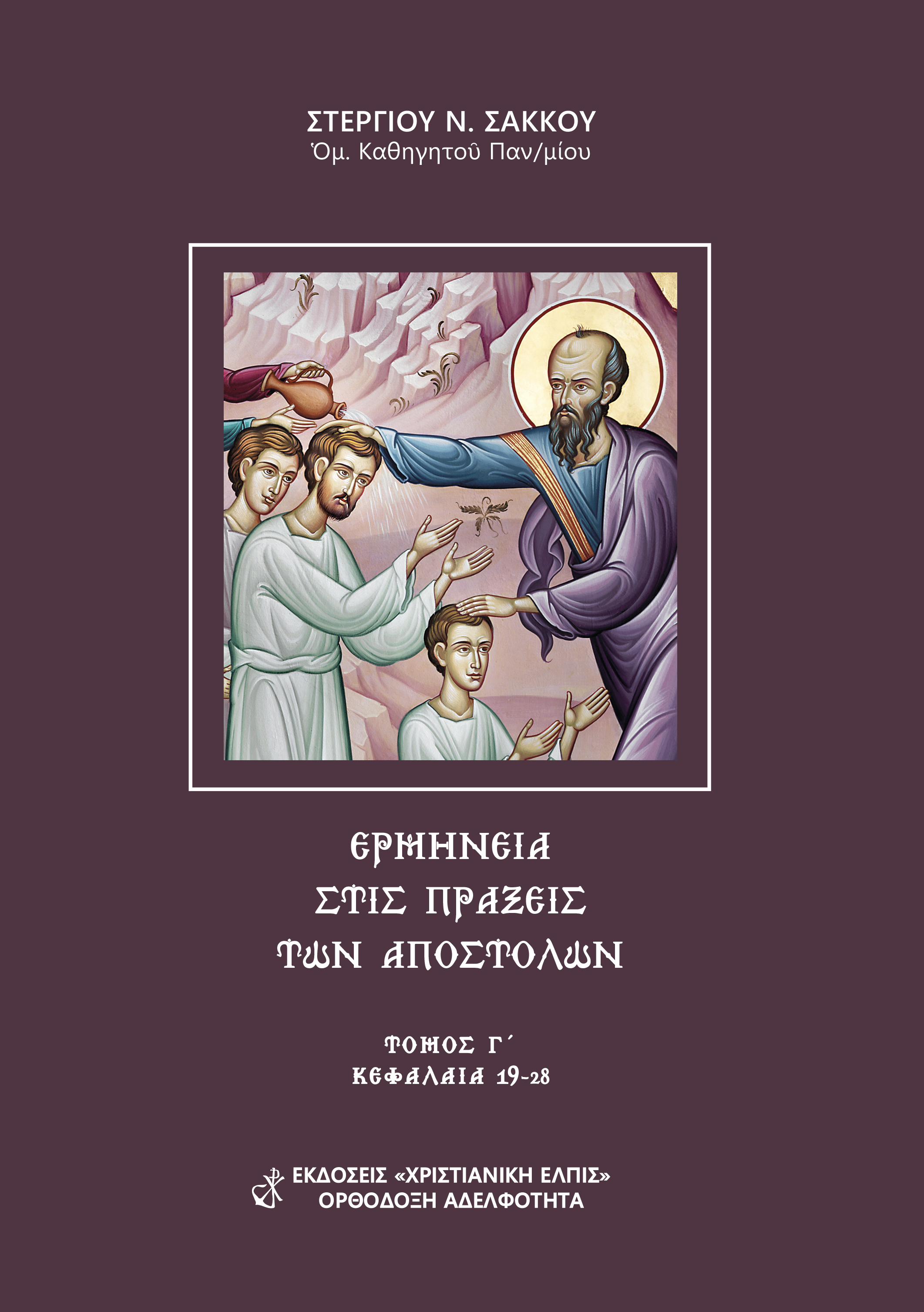

Προμηθευθεῖτε τό ἔργο αὐτό ἀπό τό Βιβλιοπωλεῖο "Ἀπολύτρωσις", Γ. Μπακατσέλου 5, Θεσ/νίκη, τηλ. 2310 274518
ἤ μέσῳ e-shop https://www.apolytrosis-books.gr/
Why should a Man Tolerate a Woman’s Faults and Comfort her in her Failures?
Saint John Chrysostom
(Speech on 1 Corinthians 26,11, ΕΠΕ 18 Α,176 - ΜG 61,223-224 η’)

But what if she is talkative and drunk and angry? Well, you must not be angry with her, but take care of her and pray to God and exhort her and counsel her and do everything to break her passion. But if you beat her, you make her situation worse. For insolence is not cured by insolence, but by forbearance and yielding. Besides the above, think of the reward God has in store for your patience. For though you have the power to send her away, and do not do so because you fear God, but put up with so many faults because you fear the law, which prevents you from expelling the woman whatever her fault may be, you shall receive a very great reward.
But even before the reward that God will give you, you will have a very great benefit, because you will also make her more disciplined, and because of her you will become more lenient. It is even said that one of the pagan philosophers, who had a wife who was vicious and talkative and drunk, when asked why he tolerated the behaviour of such a woman, he replied: I tolerate her so that I may have a gymnasium and a fighting ring in my house, so that they may train me in the patient life. For in this way, he said, I shall also be gentler to others, for I shall practise meekness daily in the house.
Conjugal Love is the Foundation of Family Happiness
Saint John Chrysostom
(Speech on Genesis 55, 3, ΕΠΕ 4, 134 – MG 54, 416-417)
 This is a true marriage, when there is a great deal of agreement between the two spouses, when there is a close connection, when they are very tightly bound in love. That is, just as the body can never rebel against itself, nor the soul against itself, so the man and the woman must not be separated and in conflict, but must be united. For only then it is possible for them to accumulate innumerable goods.
This is a true marriage, when there is a great deal of agreement between the two spouses, when there is a close connection, when they are very tightly bound in love. That is, just as the body can never rebel against itself, nor the soul against itself, so the man and the woman must not be separated and in conflict, but must be united. For only then it is possible for them to accumulate innumerable goods.
Saint John Chrysostom
(Speech on Genesis 55, 2, ΕΠΕ 4, 388 – MG 54, 481)
Jacob worked for Rachel for seven years, and it felt like a few days because he loved her. The seven years seemed like a few days to him because of the excessive love he had for the girl. When one is wounded by the craving of love, they see none of the difficulties, but they bear easily all dangers and many sufferings because they aim at one thing only: satisfying their desires.
Cross - the Embrace of God
Translation from the book:
Στεργίου Ν. Σάκκου, Ὁ Σταυρός στό φῶς τῆς Ἀνάστασης, ἐκδ. «ΧΡΙΣΤΙΑΝΙΚΗ ΕΛΠΙΣ» ΟΡΘΟΔΟΞΗ ΑΔΕΛΦΟΤΗΤΑ, Θεσ/νίκη 2019, σσ. 50-56.

It is a good opportunity that gives us something we need most now that the summer holidays are coming to an end, now that we are going back to our jobs, now that the daily hard work and the struggle to survive are pressing us from within. At this time we need the strong hand of the mighty crucified God to steady us. We need a warm embrace, the heart-warming embrace of the compassionate Jesus. His bleeding hands are wide open on the Cross, reaching out to us and assuring us of the power of His love. “Christ loved us and gave himself up for us, a fragrant offering and sacrifice to God. (Eph 5:2).
The whole world is scented by this sacrifice. The angels praise, creation rejoices and the Church delights, but while all this is happening, selfish man is unaware of it because his spiritual senses are blocked by his “ego”. Nevertheless, the Cross is the most vivid evidence of the divine consent that can gladden the universe. “For behold, through the Cross joy has come to the whole world”, we proclaim in the Easter Prayer, and indeed we are joyful because our soul finds peace under the Cross. Our daily joys become deeper when we realise that they are secured by a sacrifice. And our frequent misfortunes become lighter when we feel that God sympathises with us.
Life is like a sea, full of storms, but the pious can hold the cross in front of them. In this way, they can stop the waves and walk safely through it, just as Moses parted the Red Sea. When a loved one faces danger, temptation or sickness, in situations where no help can be offered, the pious can cross themselves. The Lord grants victory to His people, just as Moses was granted the victory of the Israelites over the Amalekites. Sometimes people are like troubled travellers in the world, wandering thirstily between ideological and philosophical currents, finally losing their love for life because they cannot find a single drop of water except bitterness and disgust. If they faithfully drop the cross in their anguish, their existence will become sweet like the water of the Merra spring in the desert.
Our Lord has told us in many ways that He loves us, and He shows us His love at different times in our lives. But what uniquely and unquestionably guarantees His love is the height and breadth of His Cross. If we wanted to distinguish and measure the great revelations of God’s love for humanity, we would highlight five: the creation of the world, the history of Israel, the Holy Cross, the Holy Scriptures and the Church.
The world is the precious heritage that the Creator has given to His creature, so that its beauty may delight us and its riches nourish us.
Israel of the Old Testament is our special ancestor who has protected the truth of our descent and divine kinship through the centuries. The miraculous deliverances of the Israelites from their mighty enemies reassure us that we are safe in God’s hands.
Christ’s revelation of Himself, His name, His glory and His plan for our eternal relationship is our great priceless treasure, deposited in the written Word of God and never to be spent. Our faith in it helps us to live and enjoy here and now, there and forever.
The Church, the people of God, is our holy family which Christ has made for His children without distinction. His love fills our souls with joy and dispels all fear, for it is from the present to the end of time.
All these great gifts are given to our lives with the embrace of God. But the Cross is God’s embrace, opened to us who are dirty, wounded or even dead, so that we can be cleansed, healed and resurrected. God hangs on the cross and suffers for us. He takes our wickedness and gives us virtue. He undergoes an adventure not because he owes us anything, but to save us from being lost. He loses His glory and spills His blood to give us glory and life. God becomes man because He wants to make man God, so that we can be with Him forever and have eternal joy. The love that our soul desires is embodied on the Cross. It assumes the dimension of God and is revealed in the face of the crucified Christ, who longs for us.
In any case, the Cross exists in the depth and essence of all God’s gifts. The Cross holds the Church together, because the sacrifice of Christ on the Cross is the foundation and strength of the Church. God’s plan for our salvation, revealed in Scripture, is contained in the simple form of the Cross. The Cross justifies the purpose of the Church. The Cross sanctifies the universe and reconciles man with his outer and inner world. Creation and history, Revelation and the Church hang from the holy wood on which our Saviour was crucified.
We too are called to hang from His Cross, however heavy and burdened we may be, so that we may feel light. To put at his root all that troubles us, to open our hearts to His love and our arms to His embrace. This is the love we need to live, as the Apostle Paul says: “And the life that I now live in the flesh I live by the faith in the Son of God, who loved me and gave himself for me” (Gal 2:20). We cross ourselves, we embrace the risen Cross of the Lord and we are lifted up into His embrace. Let us be carried by His mercy.
Copyright © 2021 by Orthodox Christian Association
«ΧΡΙΣΤΙΑΝΙΚΗ ΕΛΠΙΣ» ΟΡΘΟΔΟΞΗ ΑΔΕΛΦΟΤΗΤΑ. Used by permission. All rights reserved.
Our Hope - the Holy Cross
Translation from the book:
Στεργίου Ν. Σάκκου, Ὁ Σταυρός στό φῶς τῆς Ἀνάστασης, ἐκδ. «ΧΡΙΣΤΙΑΝΙΚΗ ΕΛΠΙΣ» ΟΡΘΟΔΟΞΗ ΑΔΕΛΦΟΤΗΤΑ, Θεσ/νίκη 2019, σσ. 43-49.
Among the banners, flags and symbols raised by the world to proclaim its slogans, our Church exalts the Holy Cross and invites us to accept its message. The history of God and man, in all its dimensions, is written on its simple shape. The greatest misery and the greatest joy meet in its heart: the despair of a dying world and the hope of a world being raised.
 Historically and theologically the Cross has in fact, two aspects: what it appears to be and what it is. It appears to be dipped in blood, tears and pain. But if we bend over its bloody stains, we will again discern two opposites: on the one hand, crime in its most terrible form, guilt in its most dreadful hour; and on the other, the greatest love and infinite tolerance. The cross of ancient times, was an instrument of torture, the most terrible means that Satan had discovered to torment man, after he had driven him to the lowest point of degradation. But since the Crucifixion of the sinless Christ, the Cross has also become the symbol of the highest love and devotion for those who love Christ and follow in His footsteps.
Historically and theologically the Cross has in fact, two aspects: what it appears to be and what it is. It appears to be dipped in blood, tears and pain. But if we bend over its bloody stains, we will again discern two opposites: on the one hand, crime in its most terrible form, guilt in its most dreadful hour; and on the other, the greatest love and infinite tolerance. The cross of ancient times, was an instrument of torture, the most terrible means that Satan had discovered to torment man, after he had driven him to the lowest point of degradation. But since the Crucifixion of the sinless Christ, the Cross has also become the symbol of the highest love and devotion for those who love Christ and follow in His footsteps.
There are three crosses on Golgotha which help us to understand historically the aspect of the cross represented in its two dimensions. On two of the crosses hang two criminals who are receiving “the due reward of their deeds”; on the other Cross hangs Jesus, who “has done nothing wrong” (Lk 23:41). At the same time, the first criminal cursed the Innocent, while the other repented and became a martyr; he bore his cross with patience, denied his shameful past and believed in a glorious future. And how? With the strength that he drew from the Cross of Jesus Christ. This is the second aspect of the Cross that all those who repent and believe can experience.
The Cross of our Lord has a rich inner content which can be infused into the cross of the thief and into every cross, if we so wish. This secret content, its indescribable richness, is the love of God, which becomes blood, and the blood becomes redemption and purification, but also a power of transformation and change. Here is the “essence” of the Cross, here is the hope of the world! A hope not like the “false hopes” of the poets, which lead to despair, nor like the fleeting hopes of our narrow horizons which leave behind them disappointment. It is the hope for which the soul of man thirsts, that he is not just a piece of earth and flesh, not a number or something destined to nothing but a being of eternal value and destiny. This hope which warms the heart and enlightens the mind, which steels the nerves and sustains the will, the hope which gives meaning to struggles, joyful endurance to sorrows, profound happiness to joys, is found only in the Cross. What honour man has when, for his sake, the precious blood of God is shed! What glory awaits him since the God-man, in a human body, fights and conquers death. What hope springs from Golgotha!
Unfortunately, the world can only see the visible aspect of the cross and rejects it. Like the Jews who saw its weakness and were tempted, like the Gentiles who saw it as folly and mocked it. The world ignores the “essence” of the Cross and doesn’t even bother to learn it, so it can never understand it. That is why today the Church, the Gospel and christians are despised, mocked, hated and fought against. But it is also the reason why today the world has lost hope and is dying of despair. It is because man has cut himself off from the Cross and relies on his own strength. He cannot even think that what he wants might be hidden in the Cross. In no way do people admit that the Cross, which they consider trivial, can embrace those who are divided, give peace to the soul, make amends between man and his God.
So man struggles all alone. He sends out rockets, literally throws his money into the air, without earning anything, not a breath of life, not a drop of relief from his stress. He raises his antennas, his science and his art, and channels mainly elements of corruption and decay into his own house, his mind and his blood. He hangs horseshoes on his door as a symbol of good luck, you see, this is neither foolish nor scandalous! He reconciles fetishism with his culture because he suffocates without hope. But hope is nowhere to be found! Modern man stands disappointed before an empty Pandora’s box; his last hopes have flown away. He believes nothing, he hopes for nothing, he is lost. He puts “Hope Wanted” in the “Classifieds” in vain. He will only find hope in the Cross.
Because hope is not in “bread and spectacle”, it is not in the refrigerator or in culture. Hope is not in shop windows, shops, chimneys, oil tanks and bombs. Hope is peace and life. A full stomach and a comfortable career are not hope, hope is a pure and light heart. The saturation of the senses and the deception of our secret desires with their substitutes are not hope. Hope is the power that guarantees joy up to eternity, the power that makes us see the other person not as a target for our vice or as an object to profit from, but as a brother, as a creature of the same Father.
If we see the Cross as a simple symbol, we do injustice to the Cross and, fatally, to ourselves. If we recognise in the Cross the blood of an Innocent Man who shed His blood on it for our sake, we have taken an important step. But if we discover in the Cross, beyond the agony of death, the triumph of life that springs from the “empty tomb” of the Crucified and Risen One, then we have found our great, true, eternal hope.
Our Church, through the Exaltation of the Holy Cross, invites us to rest under its wings. Tell me, dear faithful, if a person wants something different or something more!
Copyright © 2021 by Orthodox Christian Association
«ΧΡΙΣΤΙΑΝΙΚΗ ΕΛΠΙΣ» ΟΡΘΟΔΟΞΗ ΑΔΕΛΦΟΤΗΤΑ. Used by permission. All rights reserved.
Εὐαγγελικό ἀνάγνωσμα 1ης Σεπτεμβρίου
Λκ 4,16-22
Τήν ἐπίσκεψη τοῦ ᾿Ιησοῦ στήν Ναζαρέτ ἐξιστορεῖ λεπτομερῶς ὁ εὐαγγελιστής Λουκᾶς, ἐνῶ οἱ ἄλλοι εὐαγγελιστές τήν μνημονεύουν μέ συντομία (βλ. Μθ 13,53-58· Μρ 6,1-6).
4,16. Καὶ ἦλθεν εἰς τὴν Ναζαρέτ, οὗ ἦν τεθραμμένος, καὶ εἰσῆλθε κατὰ τὸ εἰωθὸς αὐτῷ ἐν τῇ ἡμέρᾳ τῶν σαββάτων εἰς τὴν συναγωγήν, καὶ ἀνέστη ἀναγνῶναι.
῾Ο ᾿Ιησοῦς γεννήθηκε στήν Βηθλεέμ, ἀλλά μετά τήν ἐπιστροφή του ἀπό τήν Αἴγυπτο ἐγκαταστάθηκε καί ἔζησε στήν Ναζαρέτ· γι᾿ αὐτό τοῦ δόθηκε ἡ προσωνυμία «Ναζωραῖος» (Μθ 2,23). Στό ξεκίνημα τῆς δημόσιας δράσεώς του καί ἀφοῦ προηγουμένως εἶχε κηρύξει καί θαυματουργήσει στήν εὐρύτερη περιοχή τῆς ᾿Ιουδαίας καί τῆς Γαλιλαίας, ἦλθεν εἰς Ναζαρέτ, οὗ ἦν τεθραμμένος. Θέλησε νά ἐπισκεφθεῖ τούς συμπατριῶτες του, νά ἀποδώσει τά τροφεῖα στόν τόπο πού τόν μεγάλωσε· «ἵνα καὶ ἡμᾶς διδάξῃ», γράφει ὁ ἅγιος Θεοφύλακτος, «πρότερον τοὺς οἰκείους εὐεργετεῖν καὶ τούτους ἐκδιδάσκειν, εἶτα καὶ εἰς τοὺς λοιποὺς τὴν φιλανθρωπίαν ἐκχέειν».
Στήν Ναζαρέτ, τήν ἡμέρα τοῦ Σαββάτου πῆγε στήν συναγωγή κατὰ τὸ εἰωθὸς αὐτῷ. Συνήθιζε ὁ ᾿Ιησοῦς, καθ᾿ ὅλο τό διάστημα πού ἔμενε στήν Ναζαρέτ, νά πηγαίνει στήν συναγωγή κάθε Σάββατο. ῾Η συνήθειά του αὐτή φανερώνει ὅτι εἶναι θεάρεστη ἡ συμμετοχή στίς ἱερές συνάξεις τῶν πιστῶν.
Στήν συναγωγή οἱ ὁμιλητές διάβαζαν ὄρθιοι τήν περικοπή ἐκφράζοντας ἔτσι τόν σεβασμό τους πρός τό ἱερό κείμενο. ῾Ο ᾿Ιησοῦς, πού γιά χρόνια ἦταν ἕνας ἁπλός ἀκροατής καί μαθητής στόν χῶρο ἐκεῖνο, σηκώνεται ὡς διδάσκαλος αὐτή τήν φορά νά διαβάσει, ἀνέστη ἀναγνῶναι, καί στήν συνέχεια νά κηρύξει μέ παρρησία στούς συμπατριῶτες του.
4,17. Καὶ ἐπεδόθη αὐτῷ βιβλίον ᾿Ησαΐου τοῦ προφήτου, καὶ ἀναπτύξας τὸ βιβλίον εὗρε τὸν τόπον οὗ ἦν γεγραμμένον.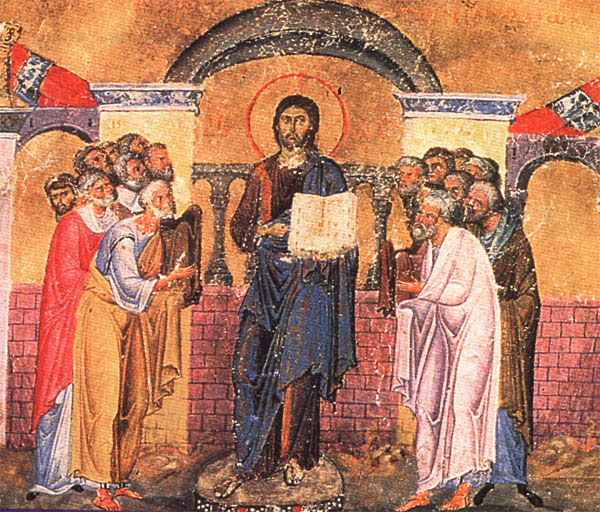 Τά βιβλία τῆς ἐποχῆς ἐκείνης εἶχαν τήν μορφή ρολοῦ, ὁ ὁποῖος φυλασσόταν μέσα σέ κύλινδρο. ῾Ολόκληρη ἡ Παλαιά Διαθήκη συμπεριλαμβανόταν σέ εἰκοσιδύο ρολούς. ῾Ο ὑπηρέτης τῆς συναγωγῆς ἔδωσε στόν Κύριο βιβλίον ᾿Ησαΐου τοῦ προφήτου, δηλαδή τόν ἀντίστοιχο ρολό. ῾Ο Κύριος ἀφοῦ ξετύλιξε, ἀναπτύξας τόν ρολό, βρῆκε τήν προγραμματισμένη περικοπή τῆς ἡμέρας· ἦταν οἱ δύο πρῶτοι στίχοι τοῦ 61ου κεφαλαίου τῆς προφητείας τοῦ ᾿Ησαΐα.
Τά βιβλία τῆς ἐποχῆς ἐκείνης εἶχαν τήν μορφή ρολοῦ, ὁ ὁποῖος φυλασσόταν μέσα σέ κύλινδρο. ῾Ολόκληρη ἡ Παλαιά Διαθήκη συμπεριλαμβανόταν σέ εἰκοσιδύο ρολούς. ῾Ο ὑπηρέτης τῆς συναγωγῆς ἔδωσε στόν Κύριο βιβλίον ᾿Ησαΐου τοῦ προφήτου, δηλαδή τόν ἀντίστοιχο ρολό. ῾Ο Κύριος ἀφοῦ ξετύλιξε, ἀναπτύξας τόν ρολό, βρῆκε τήν προγραμματισμένη περικοπή τῆς ἡμέρας· ἦταν οἱ δύο πρῶτοι στίχοι τοῦ 61ου κεφαλαίου τῆς προφητείας τοῦ ᾿Ησαΐα.
4,18-19. Πνεῦμα Κυρίου ἐπ᾿ ἐμέ, οὗ εἵνεκεν ἔχρισέ με, εὐαγγελίσασθαι πτωχοῖς ἀπέσταλκέ με, ἰάσασθαι τοὺς συντετριμμένους τὴν καρδίαν, κηρῦξαι αἰχμαλώτοις ἄφεσιν καὶ τυφλοῖς ἀνάβλεψιν, ἀποστεῖλαι τεθραυσμένους ἐν ἀφέσει, κηρῦξαι ἐνιαυτὸν Κυρίου δεκτόν.
῾Η περικοπή τήν ὁποία διάβασε ὁ ᾿Ιησοῦς στήν συναγωγή τῆς Ναζαρέτ ἀφοροῦσε στό πρόσωπο τοῦ Μεσσία, στήν σωτηρία καί στήν δόξα πού θά προσφέρει στόν λαό τοῦ Θεοῦ. ῾Ο Μεσσίας μιλᾶ μέ τό στόμα τοῦ προφήτη ᾿Ησαΐα καί λέγει· Πνεῦμα Κυρίου ἐπ᾿ ἐμέ, οὗ εἵνεκεν ἔχρισέ με. Σ᾿ αὐτόν ἀναπαύεται τό ἅγιο Πνεῦμα καί τόν καθιστᾶ τόν κατεξοχήν «Χριστόν». ῾Η ἀποστολή του παρουσιάζεται συνοπτικά ὡς ἑξῆς·
α) Εὐαγγελίσασθαι πτωχοῖς ἀπέσταλκέ με· φέρνει ἄγγελμα χαρᾶς στούς πτωχούς, δηλαδή στούς ταπεινούς καί καταφρονημένους πού ἀναζητοῦν τόν Θεό καί περιμένουν τήν θεία λύτρωση.
β) ᾿Ιάσασθαι τοὺς συντετριμμένους τὴν καρδίαν· χαρίζει τήν θεραπεία σέ ἐκείνους πού ἔχουν συντετριμμένη καρδιά, στούς ἀπελπισμένους καί ἀπογοητευμένους.
γ) Κηρῦξαι αἰχμαλώτοις ἄφεσιν· κηρύττει τήν ἀπελευθέρωση ἀπό τόν ζυγό τῆς αἰχμαλωσίας τοῦ σατανᾶ καί τῆς ἁμαρτίας.
δ) Καὶ τυφλοῖς ἀνάβλεψιν· δίνει στούς τυφλούς φῶς, φυσικό καί πνευματικό.
ε) ᾿Αποστεῖλαι τεθραυσμένους ἐν ἀφέσει· παρέχει τήν ἄφεση, τήν θεραπεία καί τήν ἀνόρθωση στούς τσακισμένους καί ἐξουθενωμένους, στούς ἀποτυχημένους. Τούς παρέχει ἐλπίδα κι ἀνοίγει διέξοδο στό ἀδιέξοδό τους.
Εἶναι ἀξιοσημείωτο ὅτι τόν πέμπτο στόχο τῆς ἀποστολῆς του τόν διατυπώνει ὁ Κύριος χρησιμοποιώντας χωρίο ἀπό προηγούμενο κεφάλαιο τοῦ ᾿Ησαΐα (βλ. 58,6) καί ὄχι ἀπό τήν συγκεκριμένη περικοπή (᾿Ησ 61,1-2), τήν ὁποία χρησιμοποίησε γιά τούς ἄλλους στόχους. ῾Ως κύριος καί κάτοχος τῆς ἁγίας Γραφῆς μποροῦσε, φυσικά, νά τήν χρησιμοποιεῖ ἐλεύθερα. Τέλος, στήν ἑπόμενη φράση συνοψίζει ὅλους τούς στόχους τῆς ἀποστολῆς του·
στ) Κηρῦξαι ἐνιαυτὸν Κυρίου δεκτόν· κηρύττει τό ἰωβηλαῖο τοῦ Θεοῦ. Οἱ ἰουδαῖοι κάθε πενήντα χρόνια κήρυτταν μέ σάλπιγγες καί τύμπανα τήν ἔναρξη τοῦ ἰωβηλαίου ἔτους, κατά τό ὁποῖο διαγράφονταν τά χρέη, ἐλευθερώνονταν οἱ δοῦλοι, ἀφήνονταν ἀκαλλιέργητοι οἱ ἀγροί (βλ. Λε 25,8-13). ῾Η γιορτή αὐτή εἶχε ὡς σκοπό τήν διατήρηση τῆς ἰσότητος μεταξύ τῶν ᾿Ισραηλιτῶν καί τήν ἀγρανάπαυση. Συνιστοῦσε προτύπωση τῆς μεσσιακῆς ἐποχῆς, κατά τήν ὁποία οἱ πιστοί θά ἀπολαμβάνουν τήν πατρική ἀγαθότητα, πού διαγράφει τίς ἁμαρτίες, ἐλευθερώνει ἀπό τά πάθη, χαρίζει φῶς καί πνευματική ἀνόρθωση, τήν ἀληθινή ἀνάπαυση καί εἰρήνη.
4,20. Καὶ πτύξας τὸ βιβλίον ἀποδοὺς τῷ ὑπηρέτῃ ἐκάθισε· καὶ πάντων ἐν τῇ συναγωγῇ οἱ ὀφθαλμοὶ ἦσαν ἀτενίζοντες αὐτῷ.
Μετά τήν ἀνάγνωση τῆς περικοπῆς ὁ Κύριος πτύξας τὸ βιβλίον, τύλιξε τό ρολό-βιβλίο, καί ἀποδοὺς τῷ ὑπηρέτῃ, ἀφοῦ τό ἐπέστρεψε γιά νά μπεῖ ξανά στήν θέση του (βλ. σχόλια στό 4,15), ἐκάθισε· μόνο κατά τήν ἀνάγνωση ὄφειλε νά μένει ὄρθιος ὁ ἀναγνώστης. Τό παράστημα τοῦ ᾿Ιησοῦ, ὁ τρόπος μέ τόν ὁποῖο διάβασε τήν περικοπή -εἶχε προηγηθεῖ ἤδη καί ἡ φήμη του- τράβηξαν τήν προσοχή ὅλων. ῎Ετσι πάντων ἐν τῇ συναγωγῇ οἱ ὀφθαλμοὶ ἦσαν ἀτενίζοντες αὐτῷ, ὅλοι κάρφωσαν τό βλέμμα τους ἐπάνω του.
4,21. ῎Ηρξατο δὲ λέγειν πρὸς αὐτοὺς ὅτι σήμερον πεπλήρωται ἡ γραφὴ αὕτη ἐν τοῖς ὠσὶν ὑμῶν.
Μέ σαφήνεια καί ἁπλότητα ὁ Κύριος ἀνέπτυξε τήν προφητεία πού διάβασε, διαβεβαιώνοντας ὅτι ἐκπληρώνεται σήμερον στό πρόσωπό του. Αὐτός εἶναι ὄχι ἁπλῶς «χριστός Κυρίου» ἀλλά «Χριστός Κύριος» (βλ. Λκ 2,11)· δέν χρειάζεται νά χρισθεῖ, διότι -ἤδη ἀπό τήν ὥρα τῆς σαρκώσεώς του- ἔχει δικό του ὅλο τό ἅγιο Πνεῦμα ὡς θεάνθρωπος, ὁμοούσιος μέ τόν Πατέρα καί τόν Παράκλητο (βλ. σχόλια στό 4,1). ῾Η προφητεία τοῦ ᾿Ησαΐα ἀποτελεῖ τό διάγγελμα τοῦ Μεσσία. Καθώς ὁ ᾿Ιησοῦς τήν ἐφαρμόζει στό πρόσωπό του ἀποκαλύπτει ὅτι εἶναι·
α) ὁ διδάσκαλος πού μέ τήν σοφία του θά διδάξει τήν ἀλήθεια καί θά ἐλευθερώσει τούς ἀνθρώπους ἀπό τήν ἄγνοια, τήν πλάνη καί τόν πόνο·
β) ὁ ἀρχιερέας πού μέ τήν θυσία του θά λυτρώσει τόν κόσμο ἀπό τήν ἁμαρτία, τήν φθορά καί τόν θάνατο·
γ) ὁ βασιλιάς πού μέ τήν δύναμή του θά δημιουργήσει μιά αἰώνια βασιλεία, στήν ὀποία οἱ πιστοί θά ἀπολαμβάνουν τήν εὐτυχία τῆς μεσσιακῆς ἐποχῆς.
4,22. Καὶ πάντες ἐμαρτύρουν αὐτῷ καὶ ἐθαύμαζον ἐπὶ τοῖς λόγοις τῆς χάριτος τοῖς ἐκπορευομένοις ἐκ τοῦ στόματος αὐτοῦ καὶ ἔλεγον· οὐχ οὗτός ἐστιν ὁ υἱὸς ᾿Ιωσήφ;
Στήν συναγωγή τῆς Ναζαρέτ δικαιώθηκε ἡ φήμη τήν ὁποία εἶχε ὁ ᾿Ιησοῦς ὡς θαυμαστός διδάσκαλος. ῞Ολοι οἱ παρευρισκόμενοι ἐμαρτύρουν αὐτῷ, ἔδιναν τήν μαρτυρία τους ὅτι μένουν κατάπληκτοι ἀπό ὅσα ἀκοῦν καί βλέπουν. Τό ρῆμα ἐθαύμαζον ἐκφράζει αὐτήν ἀκριβῶς τήν ἔκπληξή τους. ᾿Αναγνώριζαν τήν χάρη, τήν γλυκύτητα τῶν λόγων του. ᾿Εξέφραζαν ὅμως ἔντονα καί τήν ἀπορία τους· οὐχ οὗτός ἐστιν ὁ υἱὸς ᾿Ιωσήφ; Κατά τήν συνήθεια τῆς ἐποχῆς τό πατρώνυμο «υἱὸς ᾿Ιωσὴφ» ἐπέχει θέση ἐπωνύμου. Γνώριζαν οἱ κάτοικοι τῆς Ναζαρέτ τήν οἰκογένεια τοῦ ᾿Ιησοῦ. ῎Ηξεραν, ἐπίσης, ὅτι αὐτός μεγάλωσε ἀνάμεσά τους, χωρίς νά ἔχει λάβει ἰδιαίτερη μόρφωση. Δέν μποροῦσαν, λοιπόν, νά ἑρμηνεύσουν τήν σοφία καί τήν παρρησία πού χαρακτήριζε τήν διδασκαλία του. ᾿Εξάλλου, δέν ἦταν γι᾿ αὐτούς εὔκολο νά παραδεχθοῦν ὅτι ἐφαρμόζεται στόν συγχωριανό τους ὅ,τι εἶχε προφητεύσει ὁ ᾿Ησαΐας.
Στεργίου Σάκκου, Ἑρμηνεία στό κατά Λουκᾶν Εὐαγγέλιο, τόμ. Α΄, σσ. 183-191.
The Dormition-Assumption of the Theotokos
Translation from the book:
Στεργίου Ν. Σάκκου, Μηνύματα ζωῆς Β΄, ἐκδ. «ΧΡΙΣΤΙΑΝΙΚΗ ΕΛΠΙΣ» ΟΡΘΟΔΟΞΗ ΑΔΕΛΦΟΤΗΤΑ, Θεσ/νίκη 2015, σσ. 192-194.
Sleep or Death
August is the crown of summer and the jewel in this crown is the celebration of our Most Holy Theotokos. It is a little Easter in summer. It is celebrated as gloriously and triumphantly as the celebration of Christ’s Resurrection. This is not an arbitrary choice; in the minds of pious people, this feast associates the word “sleep” with the event of death. Could there be a more desirable message for the miserable man who longs to enjoy his life but he lives every day under the shadow of death?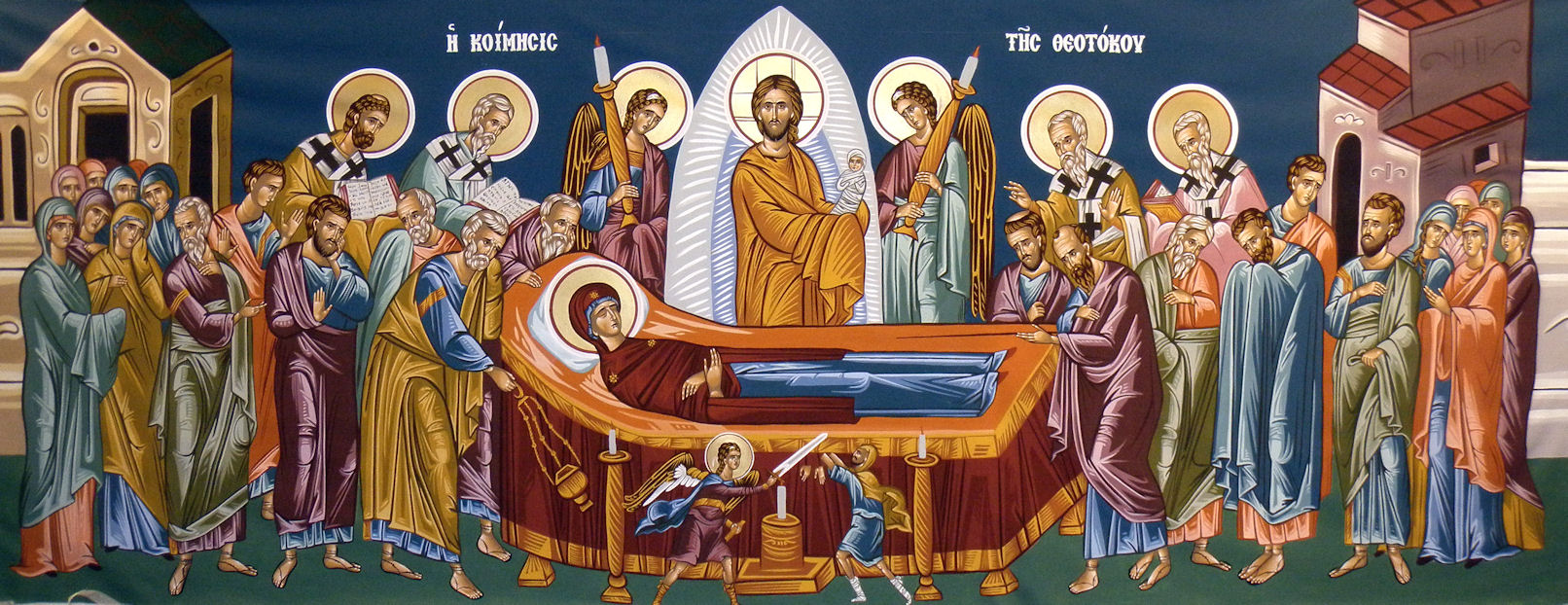 The power of death is, of course, defeated by our Lord Jesus Christ. This victory is experienced and celebrated by the Church when it is realised in the lives of the saints. Everyone who believes in Jesus Christ “has passed from death to life” (Jn 5:24) and has a first experience of the abolition of death. Death cannot hold them captive, nor can their Lord and God. For this reason, the commemoration of the day on which the saints died is not a mournful event, but a celebration. St. John Chrysostom notes that “because the saints loved their Lord, they were willing to suffer sorrows and torments in His name, which made them all the more joyful”.
The power of death is, of course, defeated by our Lord Jesus Christ. This victory is experienced and celebrated by the Church when it is realised in the lives of the saints. Everyone who believes in Jesus Christ “has passed from death to life” (Jn 5:24) and has a first experience of the abolition of death. Death cannot hold them captive, nor can their Lord and God. For this reason, the commemoration of the day on which the saints died is not a mournful event, but a celebration. St. John Chrysostom notes that “because the saints loved their Lord, they were willing to suffer sorrows and torments in His name, which made them all the more joyful”.
Christ’s victory over death is primarily declared by the Dormition of the woman who gave Lord her human flesh so that He could resurrect it and make it non-perishable. She is the saint above all saints and is therefore named “Panagia” in Greek (pano[above] – agia [saint]). There is a clear theological explanation for this. The Orthodox Church proclaims that the Virgin Mary is the symbol of the entire Church and of each pious soul. Every Christian sees themselves as a member of the Church and in the Assumption of God’s Mother, they see their own death as a dormition, a sleep in God’s hands. Therefore, a Christian is freed from the fear of death and renews the hope that their beloved people are sleeping and will resurrect one day. Every Christian can proclaim the confession of our faith, “I am looking forward to the resurrection of the dead” (Symbol of Faith).
Copyright © 2021 by Orthodox Christian Association
«ΧΡΙΣΤΙΑΝΙΚΗ ΕΛΠΙΣ» ΟΡΘΟΔΟΞΗ ΑΔΕΛΦΟΤΗΤΑ. Used by permission. All rights reserved.
